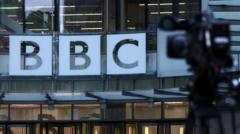How Can Strong Leadership Guide the BBC Through Its Crisis?

Published: 2025-11-10 22:00:16 | Category: technology
The recent resignations of Tim Davie and Deborah Turness from the BBC mark a significant moment for the corporation, especially in the context of mounting pressure from external sources. While similar departures have occurred in the past, the current situation is compounded by the unprecedented threat of legal action from a sitting US president, Donald Trump, seeking $1 billion in damages over alleged defamatory statements made in a BBC documentary. This unfolding crisis raises critical questions about the BBC's leadership, accountability, and its role in the media landscape.
Last updated: 24 October 2023 (BST)
What’s happening now
The BBC currently finds itself at a crossroads, grappling with severe external scrutiny and internal upheaval following the abrupt resignations of its director general, Tim Davie, and news CEO, Deborah Turness. Their departures come in the wake of allegations related to the Panorama documentary that has drawn ire from Donald Trump, who is now threatening legal action against the BBC. This situation is unprecedented in the sense that a US president is directly targeting the BBC with such serious allegations of defamation.
Key takeaways
- Tim Davie and Deborah Turness have resigned amid increasing pressure over a Panorama documentary.
- Donald Trump has threatened the BBC with a $1 billion lawsuit for alleged defamation.
- The BBC has faced accusations of systemic bias and has apologised for editing choices in the controversial documentary.
Timeline: how we got here
The current crisis at the BBC has developed rapidly over the past week, with multiple significant events unfolding:
- 17 October 2023: Claims about the Panorama documentary and its alleged bias emerge, initially reported by the Telegraph.
- 22 October 2023: Tim Davie and Deborah Turness resign from their positions, raising questions about accountability and leadership at the BBC.
- 23 October 2023: Donald Trump publicly threatens to sue the BBC for $1 billion, demanding a retraction and apology regarding the documentary.
What’s new vs what’s known
New today/this week
The most significant development is Trump's threat to sue the BBC, an action that has escalated the situation to an unprecedented level. His demands for a retraction and compensation have placed the BBC in a challenging position, needing to navigate both legal and reputational risks.
What was already established
Prior to the recent events, the BBC faced criticism for its coverage and perceived biases, especially regarding contentious political topics. The ongoing discourse around media accountability and bias has been a long-standing issue, but the current circumstances intensify these debates.
Impact for the UK
Consumers and households
For UK consumers, the implications of this crisis could be far-reaching. If the BBC is forced to pay substantial damages, it could have a knock-on effect on funding, potentially leading to cuts in programming or increased licence fees. The public's trust in the BBC may also waver, especially among those who perceive it as being influenced by political forces.
Businesses and jobs
The BBC's reputation as a leading broadcaster is at stake, and the outcome of this legal battle could affect its partnerships with other media organisations and advertisers. Additionally, the uncertainty may deter potential talent from joining the corporation amid fears about its stability.
Policy and regulation
The situation may prompt discussions around media regulation in the UK, especially concerning the accountability of public broadcasters like the BBC. It could lead to increased scrutiny from governmental bodies and calls for reforms to ensure media independence and integrity.
Numbers that matter
- £1 billion: The amount Donald Trump is threatening to sue the BBC for.
- 16 million USD: The settlement Paramount Global paid Trump over a CBS interview.
- 15 million USD: The amount ABC News settled with Trump for a defamation lawsuit.
Definitions and jargon buster
- Panorama: A current affairs television programme produced by the BBC, known for its investigative journalism.
- Defamation: The act of damaging someone's reputation by making false statements.
- Systemic bias: A tendency of a media entity to favour certain perspectives or narratives over others, often resulting in unbalanced reporting.
How to think about the next steps
Near term (0–4 weeks)
In the immediate future, the BBC will need to focus on addressing the legal threat from Trump. This may involve engaging legal counsel to prepare a robust defence while managing public relations to mitigate damage to its reputation.
Medium term (1–6 months)
Over the coming months, the BBC will need to assess its internal structures and policies to ensure accountability and transparency. This might involve consultations with stakeholders and reviewing editorial practices to restore public trust.
Signals to watch
- Updates on the legal proceedings initiated by Trump, including court dates and filing details.
- Public responses from the BBC regarding changes in leadership and policy adjustments.
- Shifts in public opinion as reflected in surveys concerning the BBC's reputation and trustworthiness.
Practical guidance
Do
- Stay informed about updates on the legal situation and its implications for the BBC.
- Engage with credible sources to understand the nuances of the ongoing discussions around media bias.
- Consider the broader impact of media accountability on democracy and public discourse.
Don’t
- Don’t jump to conclusions based on sensational headlines; seek detailed information.
- Don’t dismiss the importance of media integrity in shaping public opinion.
- Don’t ignore the potential consequences for the BBC's funding and programming as this situation unfolds.
Checklist
- Check for updates on Trump's legal actions against the BBC.
- Monitor the BBC's responses and any changes in leadership or policy.
- Evaluate how this situation may affect media consumption habits.
- Stay aware of public sentiment regarding the BBC’s role in reporting.
- Engage in discussions about the importance of impartial journalism.
Risks, caveats, and uncertainties
This situation is evolving, and there are several uncertainties that remain. The outcome of the legal action against the BBC is unknown, and it could take months or even years to resolve. Additionally, the implications of a potential settlement or loss could lead to significant changes within the BBC, affecting its operations and public perception. There is also a risk that this could set a precedent for future actions against media organisations, potentially stifling journalistic freedom.
Bottom line
The BBC is facing a pivotal moment in its history, with significant leadership changes and a legal threat from Donald Trump challenging its credibility. The coming weeks will be crucial in determining how the corporation navigates this crisis and re-establishes its standing as an impartial public broadcaster.
FAQs
What is the main issue facing the BBC currently?
The main issue is the threat of a $1 billion lawsuit from Donald Trump regarding alleged defamatory remarks made in a Panorama documentary.
Who resigned from the BBC recently?
Tim Davie and Deborah Turness have recently resigned from their positions amid escalating scrutiny and criticism over the BBC's coverage.
What are the implications of this legal threat for the BBC?
The legal threat could lead to financial repercussions for the BBC and further scrutiny of its operations and editorial practices.



